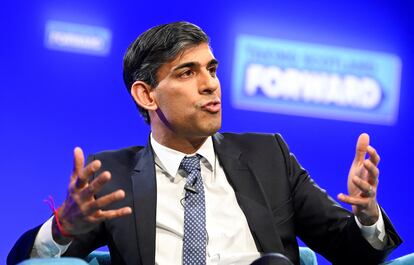British government watchdog says UK’s Rwanda deportation plan could cost nearly 500 million pounds ($630 million)
The Conservative government had earlier only revealed a 290 million pound ($366 million) commitment, so the new figures opened the plan to wider scrutiny from critics

The British government’s contentious plan to send some asylum-seekers on a one-way trip to Rwanda could cost nearly half a billion pounds, or about $630 million, plus hundreds of thousands for each deported person, a report said Friday.
The National Audit Office report — issued at the behest of parliamentary committees that complained of being in the dark about costs of the plan — provided the most comprehensive cost estimate so far.
The Conservative government had earlier only revealed a 290 million pound ($366 million) commitment, so the new figures opened the plan to wider scrutiny from critics.
“These figures reveal the extortionate bill the taxpayer will have to pay the Rwandan government for an unworkable and inhumane scheme that will not deter people seeking protection on our shores,” said Enver Solomon, chief executive of the Refugee Council.
No asylum-seeker has been sent to Rwanda under the plan, which has been blocked by the courts, though the U.K. government has already paid 220 million pounds ($278 million) to the government in Kigali under the Economic Transformation and Integration Fund to support the country’s growth.
The plan is aimed at deterring unauthorized migrants from making dangerous English Channel crossings in unsafe boats. Under the plan, asylum-seekers would be sent to Rwanda, where their claims would be processed and where they would stay if approved.
Human rights groups have attacked the plan as cruel and unworkable.
After the Supreme Court blocked the plan as unlawful, Britain and Rwanda signed a treaty pledging to strengthen protections for migrants and lawmakers in the House of Commons approved a bill that declared the east African nation a safe country. The bill still needs approval in the House of Lords, where it has run into resistance.
The audit showed an extra 100 million pounds would be spent for the partnership through 2026 and 120 million pounds ($151 million) would go into the fund after 300 migrants are relocated to Rwanda.
In addition, each migrant’s plane ticket would cost 11,000 pounds ($13,900). Another 20,000 pounds ($25,200) would be paid to Rwanda for each relocated asylum seeker and nearly 151,000 pounds ($190,000) would be spent over five years for processing costs and living expenses for each person who stays in Rwanda.
“This report reveals the national scandal the Tories have been trying to hide,” said Yvette Cooper, a Labour member of Parliament.
“Its shocking analysis shows the costs of the failed Rwanda farce are even higher than previously thought,” she added. “In order to send less than 1% of U.K. asylum seekers to Rwanda on a few symbolic flights, the taxpayer will be forced to fork out over half a billion pounds — with no ability to recover any of the money already sent.”
The Home Office defended the plan and said the government would focus on starting flights once the Safety of Rwanda Bill is passed and the treaty between the two nations is in place.
“It is vital we respond to illegal migration with bold, long-term solutions,” a statement read. “Unless we act, the cost of housing asylum seekers is set to reach 11 billion pounds ($13.9 billion) per year by 2026. Illegal migration costs lives and perpetuates human trafficking, and it is therefore right that we fund solutions to break this unsustainable cycle.”
Sign up for our weekly newsletter to get more English-language news coverage from EL PAÍS USA Edition
Tu suscripción se está usando en otro dispositivo
¿Quieres añadir otro usuario a tu suscripción?
Si continúas leyendo en este dispositivo, no se podrá leer en el otro.
FlechaTu suscripción se está usando en otro dispositivo y solo puedes acceder a EL PAÍS desde un dispositivo a la vez.
Si quieres compartir tu cuenta, cambia tu suscripción a la modalidad Premium, así podrás añadir otro usuario. Cada uno accederá con su propia cuenta de email, lo que os permitirá personalizar vuestra experiencia en EL PAÍS.
¿Tienes una suscripción de empresa? Accede aquí para contratar más cuentas.
En el caso de no saber quién está usando tu cuenta, te recomendamos cambiar tu contraseña aquí.
Si decides continuar compartiendo tu cuenta, este mensaje se mostrará en tu dispositivo y en el de la otra persona que está usando tu cuenta de forma indefinida, afectando a tu experiencia de lectura. Puedes consultar aquí los términos y condiciones de la suscripción digital.








































